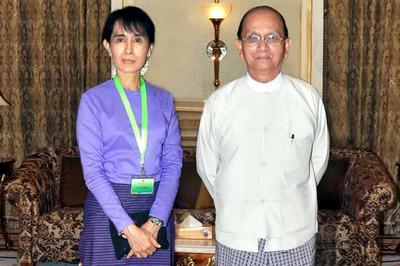A high-profile meeting between Thein Sein and Aung San Suu Kyi in August was seen as an icebreaker to overcome the animosity between the two camps. And the state-run newspaper, The New Light of Myanmar, has abandoned its long-held practice of daily Stalinist attacks against foreign press and internal dissent.
This suggests that the government is willing to drop its hardline rhetoric and repeal some of its repressive SPDC-era practices. More recently, the government lifted its censorship of foreign news websites, including some of the harshest exiled critics of the government. The relaxation of internet control coincided with the new ambassador-level US special envoy Derek Mitchell’s first visit to Myanmar. A Human Rights Commission was also established around this same time in early September, albeit one primarily staffed by former diplomats and civil servants. Finally, Thein Sein has openly called for Burmese exiles to return and help build the country.
These recent events suggest a serious overture for the new government to improve its international standing and appease the general population — especially in the current climate of economic uncertainty. The dramatic appreciation of the Myanmar kyat has been particularly damaging for the agricultural sector and for many of the country’s already abysmal manufacturing and export businesses.
Part of the frustrations in Myanmar is linked to the continued encroachment on the country’s resources by a visibly growing China — the recent suspension of the Myitsone Dam project demonstrates this. There appears to be discussion within some government circles aimed at countering an increasingly assertive China by seeking alternative actors to help with the development and re-structuring of its dire economy. If Myanmar becomes ASEAN chair in 2014, its leverage in its dealings with China might increase and give the country an alternative platform to engage the US and the European Union.
But major obstacles still remain that could threaten to derail current reforms. For one, Naypyidaw does not have absolute control of its territory, with several armed ethnic groups openly challenging the state’s authority. Though Thein Sein has called for peace talks with armed ethnic groups, fighting has intensified against the Kachin Independence Army in Northern Myanmar. Without directly taking account of these ethnic groups, any attempts at reconciliation risk collapse. The Upper House has approved a proposal to establish a peace commission to help resolve the ongoing ethnic conflicts. But as a sign of good faith, the government should halt its military offensives and further commit to the peace talks that the president appealed for.
The newly created Human Rights Commission recently wrote an open letter to the president urging Thein Sein to release ‘prisoners of conscience’, a remarkable departure from past practice where the SPDC repeatedly denied the existence of political prisoners. In May, the president granted an amnesty to more than 14,000 prisoners, though few of the early releases were political offenders. A second round of amnesty announced a day after the open letter included some high profile political prisoners, though many remain behind bars. If the government makes a firmer commitment to release the country’s remaining political prisoners, this would potentially generate further goodwill from the opposition and the international community. A more comprehensive political amnesty would be a major breakthrough, and if this is the case, the US-led sanctions should be re-evaluated and gradually relaxed; ideally, by repealing some of the more stringent clauses. A more engaged US, with a fresh attitude toward sanctions, should also allow a greater mandate for international institutions such as the IMF, the World Bank and UN agencies to expand their role in helping the new government overcome many of its developmental obstacles.
Myanmar is at a critical, yet optimum juncture that could potentially lead to a more positive stage in a new chapter of the country’s history. Aung San Suu Kyi is said to have responded favourably to her recent meeting with Thein Sein, and believes changes are taking place in Myanmar. As the two sides are enjoying a new honeymoon period, all concerned stakeholders must capitalise on this momentum of change by finding a common agenda that will allow Myanmar to move toward real national reconciliation.
The stakes remain high for both sides of the political divide. In the event that military hardliners see little progress in improving Myanmar’s international standing, or, worse, if the economy deteriorates and leads to mass social unrest, they could very well muscle back into control of the nation’s agenda before the process of reform truly takes off.
Roger Lee Huang is a PhD student in the Department of Asian and International Studies at the City University of Hong Kong.

